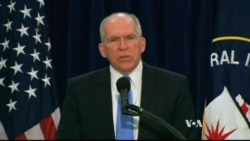U.S. Central Intelligence chief John Brennan is slamming those who accuse his agency of torturing detainees at secret prison sites, saying its interrogation methods helped prevent terror attacks against the United States.
At a live news conference from Central Intelligence Agency headquarters Thursday, Brennan acknowledged that "abhorrent" methods were used on terror suspects following the September 11, 2001 attacks on the U.S.
But he largely defended the interrogation program, saying "useful and valuable information" was acquired after the CIA used what he referred to as "enhanced interrogation techniques," or EITs.
"The cause and effect relationship between the application of those EITs and the ultimate provision of information is unknown and unknowable. But for someone to say that there was no intelligence of any value, of use, that came from those detainees once they were subjected to EITs, I think that lacks any foundation at all," said Brennan.
Earlier this week, a Senate report detailed how CIA interrogators used brutal interrogation methods on prisoners, including waterboarding - or simulated drowning - forced feeding through the rectum and mock executions.
Brennan declined to say whether any of the methods used should be called torture, though he did say that "a limited number" of CIA officials went "outside the bounds" of approved rules and abused prisoners.
The spy chief insisted the CIA no longer participated in the abuses. But he refused to rule out whether a future U.S. administration would use similar techniques when faced with an imminent threat, saying he would "defer to the policymakers in future times."
Human rights activists are calling for the prosecution of officials involved in the CIA's use of the extreme interrogation methods, which have also attracted much criticism from foreign leaders.
On Wednesday, the Justice Department said the U.S. is committed to complying with its domestic and international obligations, but would object to foreign prosecution of U.S. officials.
President Barack Obama said the abuses were terrible mistakes that should not be repeated. He banned the use of the so-called "enhanced interrogation techniques" when he took office in 2009.








